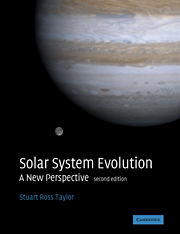Book contents
- Frontmatter
- Contents
- Preface to the First Edition
- Preface to the Second Edition
- Acknowledgments
- Prologue
- Chapter 1 A brief history
- Chapter 2 The universe
- Chapter 3 Stars
- Chapter 4 The solar nebula
- Chapter 5 Composition and chemical evolution of the solar nebula
- Chapter 6 The evidence from meteorites
- Chapter 7 Building planets
- Chapter 8 The giant planets
- Chapter 9 Satellites and rings
- Chapter 10 The refugees
- Chapter 11 The survivors: Mercury and Mars
- Chapter 12 The twins: Venus and the Earth
- Chapter 13 The Moon
- Chapter 14 The role of impacts
- Chapter 15 Epilogue: on the difficulty of making Earth-like planets
- Name index
- Subject index
Chapter 8 - The giant planets
Published online by Cambridge University Press: 05 June 2012
- Frontmatter
- Contents
- Preface to the First Edition
- Preface to the Second Edition
- Acknowledgments
- Prologue
- Chapter 1 A brief history
- Chapter 2 The universe
- Chapter 3 Stars
- Chapter 4 The solar nebula
- Chapter 5 Composition and chemical evolution of the solar nebula
- Chapter 6 The evidence from meteorites
- Chapter 7 Building planets
- Chapter 8 The giant planets
- Chapter 9 Satellites and rings
- Chapter 10 The refugees
- Chapter 11 The survivors: Mercury and Mars
- Chapter 12 The twins: Venus and the Earth
- Chapter 13 The Moon
- Chapter 14 The role of impacts
- Chapter 15 Epilogue: on the difficulty of making Earth-like planets
- Name index
- Subject index
Summary
Jupiter and Saturn are splendid planets. With their associated rings and satellites, they excite the admiration of all observers. One perceptive writer compared the giant planets to French impressionist paintings. “Jupiter's orange and yellow bands are so roiled up that its disk might have been painted by van Gogh at Arles. Saturn, with more delicate bands of ochre, resembles a Monet haystack in a sunlit mist. Uranus' disk, though, is so featureless and limpid as to suggest the still pond around a Monet water lily” [1].
Saturn, recorded from the seventh century BC by the Babylonian astronomers, was the outermost planet known to the ancients. Uranus was the first planet to be discovered since antiquity. Its discovery by William Herschel (1738–1822) in 1781, although often called accidental, resulted from his careful checking of star positions and so was inevitable. He called it George's Star (Georgium Sidus) after King George III, who presented Herschel with a lifetime pension. Such nationalistic fervor did not receive universal acclaim and the planet was soon given the classical name of Uranus. Next it was discovered that the orbit of Uranus was being affected by another large body further away from the Sun. Study of these variations in the orbit of Uranus led eventually to the discovery, in 1846, of another large planet, Neptune.
- Type
- Chapter
- Information
- Solar System EvolutionA New Perspective, pp. 197 - 222Publisher: Cambridge University PressPrint publication year: 2001



